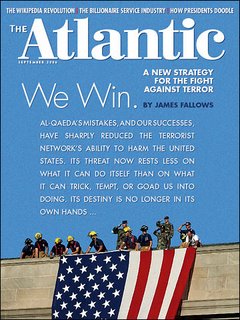Fallows Says: "We Win"

James Fallows is the author of the cover story in this month's Atlantic. Over the course of the "War On Terror," Fallows has been providing levelheaded and insightful analysis on the conflict. I know of no other writer as accurate when it comes to striking a tone resonant with truth. This month J.F. does it again. He proposes an end to the WOT. It's as simple as saying "We Won." al-Qaeda is sufficiently disabled so as to no longer pose a threat the scale of another 9/11.
The power of al-Qaeda (and other disparate terrorist groups) no longer lies in what damage they can inflict upon us, but in provoking us to shoot ourselves in the foot (see "Iraq"), a tactic which has been named by others "superpower baiting." By keeping us engaged in a "war." The terrorists are achieving as least some level of victory. Let's call an end to the WOT.
From The Atantic:
In its past military encounters, the United States was mainly concerned about the damage an enemy could do directly—the Soviet Union with nuclear missiles, Axis-era Germany or Japan with shock troops. In the modern brand of terrorist warfare, what an enemy can do directly is limited. The most dangerous thing it can do is to provoke you into hurting yourself.
This is what David Kilcullen meant in saying that the response to terrorism was potentially far more destructive than the deed itself. And it is why most people I spoke with said that three kinds of American reaction—the war in Iraq, the economic consequences of willy-nilly spending on security, and the erosion of America’s moral authority—were responsible for such strength as al-Qaeda now maintained. . .
The United States is immeasurably stronger than al-Qaeda, but against jujitsu forms of attack its strength has been its disadvantage. The predictability of the U.S. response has allowed opponents to turn our bulk and momentum against us. Al-Qaeda can do more harm to the United States than to, say, Italy because the self-damaging potential of an uncontrolled American reaction is so vast.
How can the United States escape this trap? Very simply: by declaring that the “global war on terror” is over, and that we have won. “The wartime approach made sense for a while,” Dearlove says. “But as time passes and the situation changes, so must the strategy.”. .
War implies emergency, and the upshot of most of what I heard was that the United States needs to shift its operations to a long-term, nonemergency basis. “De-escalation of the rhetoric is the first step,” John Robb told me. “It is hard for insurgents to handle de-escalation.” War encourages a simple classification of the world into ally or enemy. This polarization gives dispersed terrorist groups a unity they might not have on their own. Last year, in a widely circulated paper for the Journal of Strategic Studies, David Kilcullen argued that Islamic extremists from around the world yearn to constitute themselves as a global jihad. Therefore, he said, Western countries should do everything possible to treat terrorist groups individually, rather than “lumping together all terrorism, all rogue or failed states, and all strategic competitors who might potentially oppose U.S. objectives.” The friend-or-foe categorization of war makes lumping together more likely.

1 Comments:
Hey, didn't I hear somewhere that this magazine has a readership of almost 500,000??? ;)
Post a Comment
Subscribe to Post Comments [Atom]
<< Home